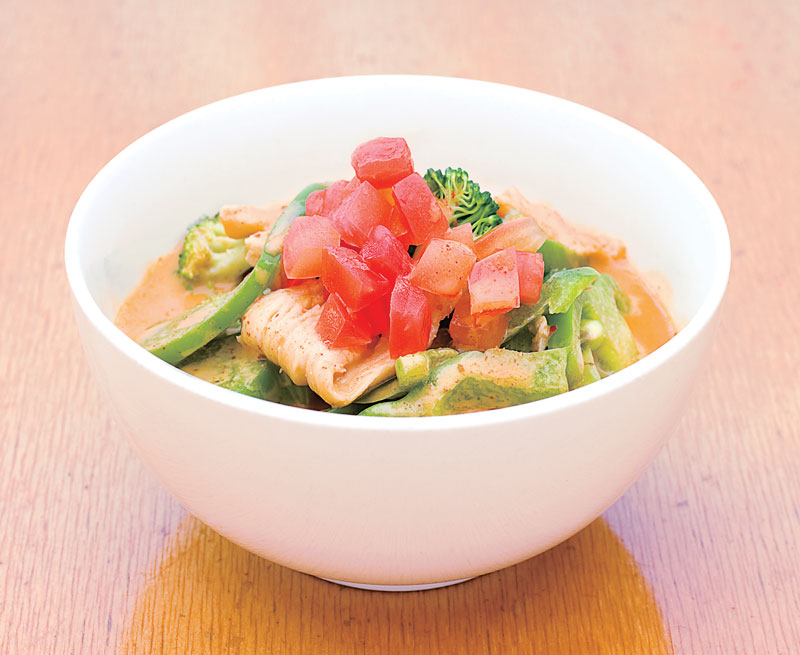Tin Drum AsiaCafé is rooted in tradition, but focused on innovation.
Steven Chan, founder of Tin Drum, says the quick-serve Pan-Asian concept is named after the tin drummer, who in ancient cultures served as the local newscaster and wake-up caller. Each morning, he walked the streets banging a tin drum, beckoning people to gather at a café. He would report the news while they ate.
“We no longer need the tin drummer, but we honor his legend,” Chan says. “The concept of the tin drummer is about the hustle and bustle and energy of the street. At the same time, our first location was on the Georgia Tech campus in Technology Square, so we understand the importance of technology and innovation and want to challenge ourselves to do things better through technology.”
Chan, a Georgia Tech alum, says one way Tin Drum uses technology to sell stir-fry, curries, noodle dishes, and other Chinese, Vietnamese, and Thai favorites, is through a self-ordering kiosk that utilizes health-based software so customers can match foods to their personal dietary goals. The kiosks were added in early 2011.
If a customer selects the “manage high blood pressure” option, for example, low-sodium options are listed on the screen. Other choices include “manage my diabetes,” low-carb, gluten-free, and “build muscle.” Diners can also choose a calorie range they want their meal to fit into.
“The software also helps the staff in terms of knowledge,” Chan says. “If a customer has questions about a specific dish, the staff can use the software to answer them.”
Chan says all Tin Drum locations have the kiosks, but customers have the option of ordering at the counter. Kiosk usage is highest, about 55 percent, at the three Tin Drum locations near college campuses.
“Once kiosk usage goes over a threshold of 35–40 percent, it reduces labor costs,” he says. “In the past, we needed two cashiers at the Georgia Tech location, and now we only need one.”
Tin Drum AsiaCafé
Founder: Steven Chan
HQ: Atlanta
Year Started: 2003
Annual Sales: $10 million
(2012 projection)
Total Units: 12
Franchise units: 10
Whether ordering at the counter or kiosk, customers might find the Tin Drum menu extensive, but Chan says dishes use a lot of common ingredients. “The Tin Drum menu is designed to be executed easily,” he says. “Some Asian dishes are difficult to compose, but the ones on the Tin Drum menu are the easy ones and use many common parts.”
Chan views his foodservice operation as “a public servant.”
“We really want to put in items people enjoy,” he says. “For me, Tin Drum is for everybody. If you like American-Asian stir-fry like sesame chicken, that’s OK, we have that. If you are the type of person who eats chicken feet in Chinatown and you want more authentic Asian, well, we don’t have chicken feet, but we do have more authentic dishes.” One of the best sellers at Tin Drum is the Crab N Cheese Roll, served with sweet-and-sour sauce for $1.50 apiece. Chan says it is similar to Crab Rangoon but in the shape of an egg roll.
“People are addicted to the Crab N Cheese Roll,” he says. “We sell thousands and thousands.”
One of the more authentic offerings at Tin Drum is the Panang Curry, with sautéed chicken, bell peppers, and broccoli in a curry sauce made from coconut milk and a red curry paste. “It’s quite mild and almost like a chowder,” Chan says. “It’s very hearty and goes well with our steamed jasmine rice.”
Chan says Tin Drum’s fried rice is popular, especially the Basil Fried Rice made with green beans, basil, jalapeños, and chicken stir-fried with Thai brown sauce.
Another more authentic dish is Sing Chow Men.
“It’s not a top seller, because in America the most popular noodle dishes are Lo Mein or Pad Thai,” Chan says. “But in Asia, Sing Chow is most popular. It’s cooked with curry powder and has a little kick to it. We have some dishes simply because we are rooted in tradition.”
An average ticket at a Tin Drum is $9–$11. Chan says that varies a lot because customers have the option of getting a substantial $7.50–$8 entrée or a light meal composed of a spring roll and a Street Taco for about $5.
“A Street Taco is our representation of a street wrap,” he says. “We used to serve them in Indian bread, but we switched to tortillas. The fried tempura shrimp wrapped in a tortilla is popular. It’s finger food. It’s fun.”
Tin Drum is taking its fun food beyond its home state of Georgia to the 10 states surrounding it. “We tend to grow slow,” Chan says. “Between 2003 and 2010, we grew to six units. We started franchising in April 2001, and by the end of this year, we will have 13. Through 2013, we hope to open 10 more locations.”
Chan says beyond 2013, Tin Drum’s growth depends on how well the existing units can be supported.
“Supporting the franchisees is the focus,” he says. “Just like in operations where you have to think food safety first even before customer service, supporting franchisees comes first before growth.”








